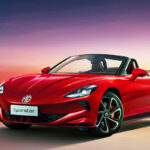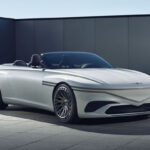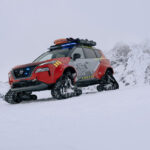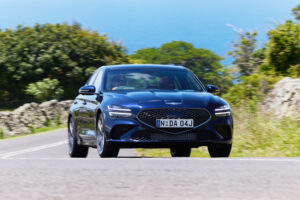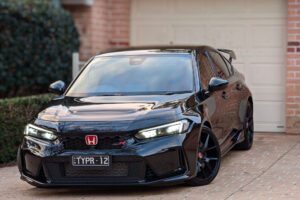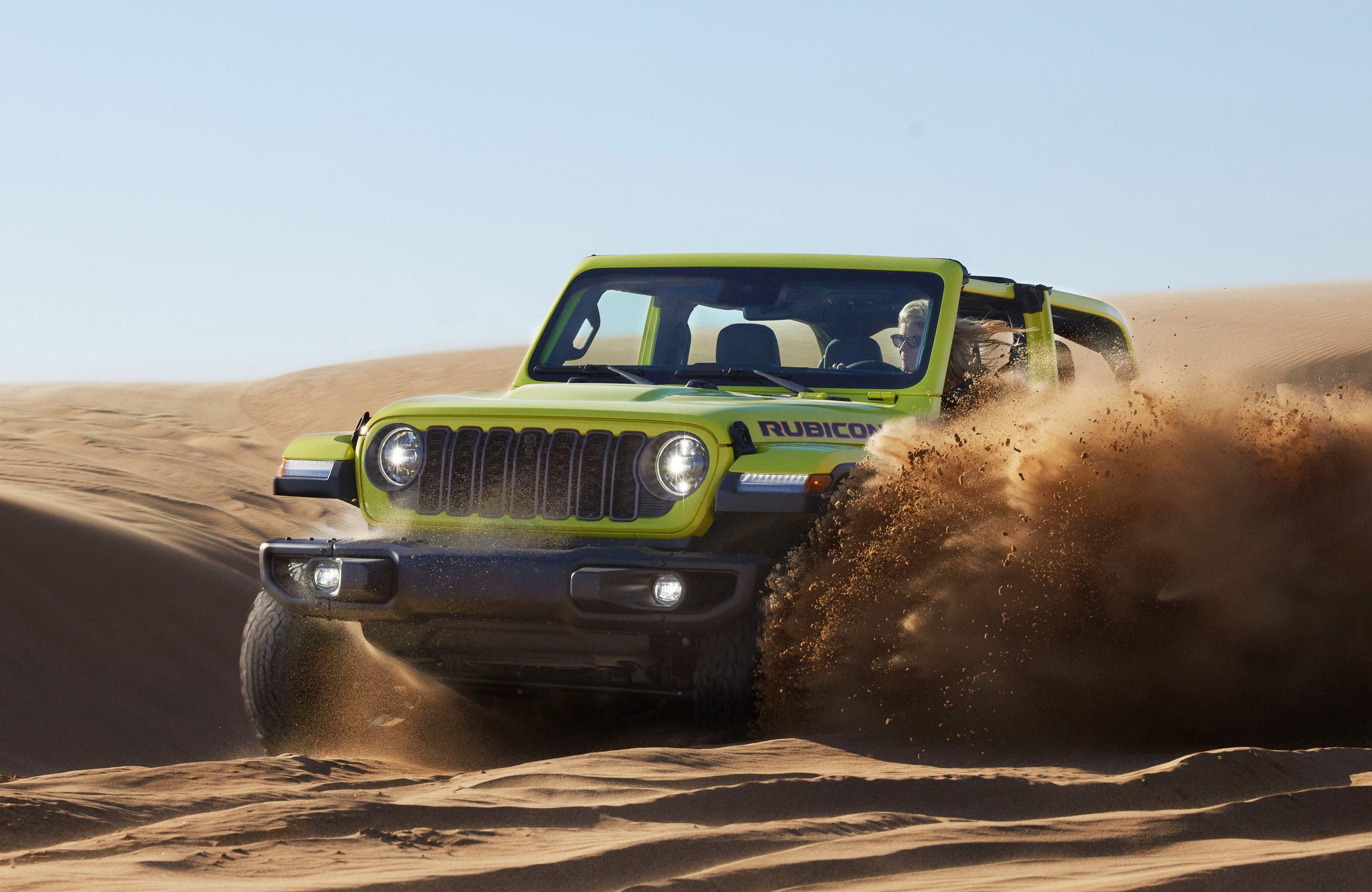
The Jeep Wrangler has changed direction, with the off-road icon, among other things, turning its back on bitumen soft-roading to step up in the rough with more pulling power at low revs.
For the 2024 Wrangler, the Pentastar V6 engine has been retired in favour of a turbocharged four-cylinder motor, the latter forgoing 9 kW of power in favour of 53 Nm more torque and better fuel economy. Towing capacity remains unchanged at 2495 kg for a braked trailer.
The MY24 Wrangler comes in four variants, all cheaper and with more equipment than the models they replace – the Sport S four-door, which replaces the Night Eagle 4dr, Overland 4dr and Rubicon 2dr and 4dr. Prices start at $75,950 for the entry-level Sport S and top out at $90,450 for the Rubicon 4dr. All are before on-road costs and dealer delivery charges.
STYLING
The latest Jeep Wrangler shows the way with a reworked seven-slot grille with dark slots, metallic bezels, and body-matched surround, while an antenna is integrated into the ‘Gorilla Glass’ windscreen out of the way of low tree branches in the bush.
Badging follows the Jeep tradition, like an overachieving Boy Scout, leaving no doubt as to the model and what it is good at.
Eighteen-inch alloy wheels come in a range of modern designs, with the spare clinging to the rear barn door under a solid cover.
INTERIOR
Interior space on offer is more in line with what you’d get in a medium-sized SUV. Overland and Rubicon models now boast McKinley leather seats with 12-way power up front and four-way lumbar support, as well as a hard seat back panel.
A cramped footwell leaves next to no space for the driver’s left foot, a nod to the wagon’s left-hand drive origins. The handbrake also lines up on the left of the transmission tunnel.
Keeping an eye on the weather? The optional one-touch top opens up the somewhat sombre cabin surroundings, letting in light and air. Got time to spare? Grab the tool kit and really free up the interior, removing roof, doors, windscreen and almost anything that’s not welded on.
The boot will take 898 litres of cargo with the rear seat backs up and 2050 litres to the roof line with the backs folded. A rear seat reminder checks for kids or other stuff in danger of being left behind when leaving the vehicle.
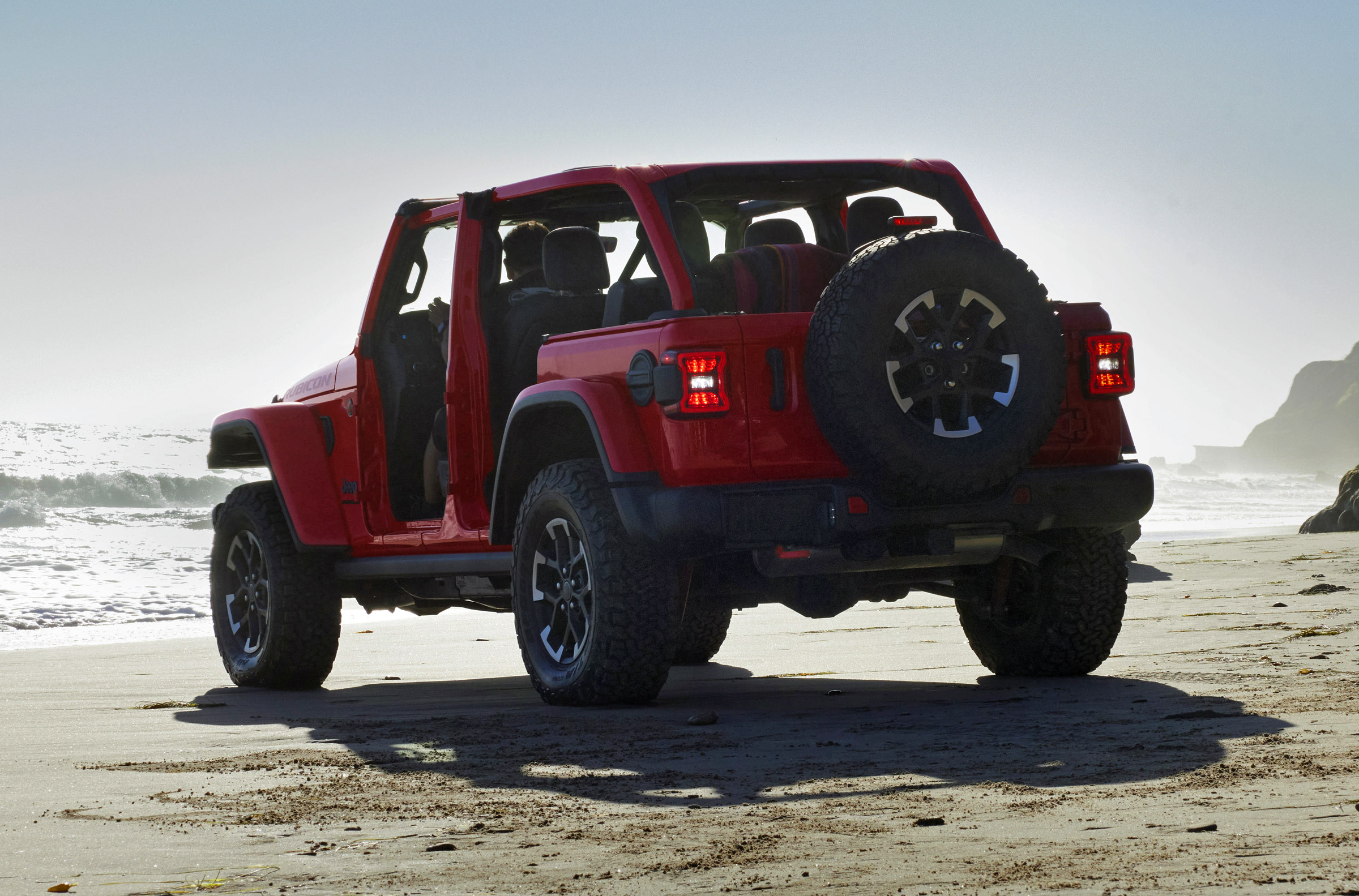
INFOTAINMENT
The new 12.3-inch touchscreen is the biggest and most advanced display offered on Wrangler. It offers a customisable home screen, plus access to the Jeep Uconnect 5 system. Also new are wireless Apple CarPlay and Android Auto.
With one-touch operation there’s simultaneous connectivity for two Bluetooth devices, five user profiles, plus a valet mode with music preferences, apps, seat positioning, mirror angles and climate control air-con.
The Wrangler features an Alpine Premium Audio System with a 552-watt 12-channel amplifier, eight speakers and a rear subwoofer. The system is enhanced by active noise cancellation and acoustic laminated windshield glass.
ENGINE/TRANSMISSION
As mentioned above the Wrangler is powered by a 2-litre four-cylinder turbo petrol engine pumping out 200kW of power and 400Nm of torque. Left behind is the V6 Pentastar motor. The new unit is mated with an eight-speed automatic transmission and Jeep’s Selec-Trac 4×4 system.
SAFETY
All models now include first and second-row curtain airbags as well as the standard front and side seat-mounted airbags already fitted. Active safety includes autonomous emergency braking, adaptive cruise control with stop function, blind-spot monitoring, rear cross-traffic alert, rear-view camera and front and rear parking sensors.

DRIVING
Jeep claims combined urban / highway cycle fuel consumption of 9.2 litres per 100 kilometres for the Sport S and Overland, and 9.9 litres per 100 kilometres for the Rubicons, down from 9.7L/100km and 10.3L/100km of the V6. The test Overland recorded 15.6 and 7 litres per 100 kilometres, respectively, on recommended 95 RON premium petrol.
The Wrangler incorporates lightweight, high strength aluminium body-on-frame design with a five-link front and rear suspension, which features upper and lower high-strength steel control arms, full-width high-strength steel track bars and tuned shocks for a balanced on- and off-road performance. On test, on the bitumen there was tyre noise from the rugged Bridgestone Duellers.
Trail rated on the Rubicon in the Sierra Nevada, the Wrangler Overland’s Selec-Trac 4 4 System provides automatic swapping of two- and four-wheel drive, Dana solid front and rear axles, two-speed transfer case, traction control and four skid plates.
This provides part-time low and high range, and high range and high range full-time automatic 2WD and 4WD switches according to driving conditions.
SUMMARY
At close to $85,000 before on-road costs, or nearly $95,000 on the road with the optional fabric roof, the test Overland pulled up short on city sophistication. However, I know what I’d rather be crossing the US Rubicon in.
RATINGS
Looks: 8/10
Performance: 9/10
Safety: 5/10
Thirst:7/10
Practicality: 8/10
Comfort: 8/10
Tech: 8/10
Value 6/10
AT A GLANCE
MODEL LINE-UP
Jeep Wrangler Sport S 4dr $75,950
Jeep Wrangler Overland 4dr $84,950
Jeep Wrangler Rubicon 2dr $83,950
Jeep Wrangler Rubicon 4dr $90,450
Options: Premium paint $1490, Sky one-touch power top $6450, 18in alloy wheels $950
Note: these prices do not include government of dealer delivery charges. Contact your local Jeep dealer for drive-away prices.
SPECIFICATIONS (Jeep Wrangler Overland 2.0L 4-cyl turbo petrol 8sp auto 4WD SUV)
ENGINE:
Capacity: 2.0 litres
Configuration: 4 cylinders inline
Maximum power: 200 kW
Maximum torque: 400 Nm
Fuel: Petrol 95 RON
Combined fuel cycle 9.2-9.9 litres per 100 kilometres
DRIVELINE: 8sp automatic, Selec-Trac 4×4
DIMENSIONS:
Length: 4882 mm
Wheelbase: 3008 mm
Width: 1894 mm
Height: 1838 mm
Turning circle: 12.4 m
Fuel tank: 81 litres
BRAKES:
Front: Ventilated disc
Back: Ventilated disc
STANDARD WARRANTY:
Five years / unlimited kilometres
Five years / roadside assistance




